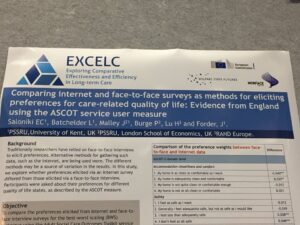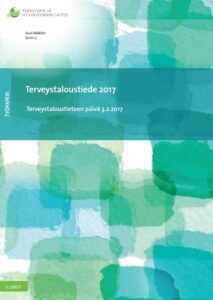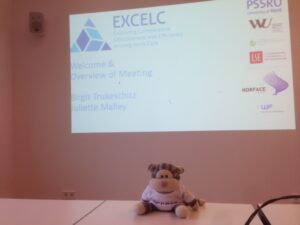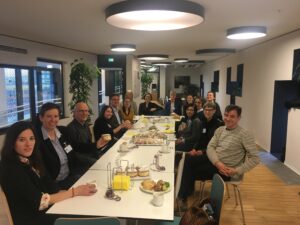 Autorinnen: Judith Kieninger, Ruth Fulterer, Assma Hajji und Birgit Trukeschitz (Wirtschaftsuniversität Wien, Forschungsinstitut für Altersökonomie)
Autorinnen: Judith Kieninger, Ruth Fulterer, Assma Hajji und Birgit Trukeschitz (Wirtschaftsuniversität Wien, Forschungsinstitut für Altersökonomie)
Erste Erfahrungen der InterviewerInnen in Österreich aus dem Forschungsprojekt „EXCELC – Lebensqualität durch Betreuung und Pflege“
Über die Interviews
25 Interviewerinnen und Interviewer wurden in Österreich bislang vom Team des Forschungsinstituts für Altersökonomie der Wirtschaftsuniversität Wien eingeschult. Sie übernahmen im Zeitraum Mai 2016 bis Februar 2017 Interviews in den Bundesländern Wien, Niederösterreich, Oberösterreich und Vorarlberg. Die Aufgabe der InterviewerInnen in dem Forschungsprojekt „EXCELC – Lebensqualität durch Betreuung und Pflege“ ist es, pflegebedürftige Menschen und ihre Angehörigen zu besuchen und mit ihnen entlang eines Fragebogens über ihre Lebenssituation und die Betreuung und Pflege Zuhause zu sprechen. Die Datenerhebung erfolgte in Zusammenarbeit mit dem Sozialministerium und wurde unterstützt von Pflege- und Betreuungsorganisationen sowie den Verwaltungseinheiten in den Bundesländern.
Wer sind unsere InterviewerInnen?
Unsere InterviewerInnen haben größtenteils einen sozialwissenschaftlichen Hintergrund und verfügen über Kenntnisse aus dem Bereich der Soziologie, der Sozialen Arbeit, der Wirtschaftswissenschaften, Gesundheitswissenschaften, aber auch der Rechtswissenschaften. Manche sind noch in Ausbildung und sehen die Interviewtätigkeit als gute Gelegenheit, um Erfahrungen in der empirischen Sozialforschung zu sammeln. Einige wenige unter ihnen sind selbst im Pflegebereich tätig. Sie schätzen die Möglichkeit, durch die Interviewtätigkeit eine neue Perspektive einnehmen zu können. Zwei Drittel der InterviewerInnen sind Frauen und die Altersspanne reicht von 20 bis 55 Jahre, wobei sich die meisten im jungen Erwachsenenalter befinden.
Alle InterviewerInnen halten das Kernteam über den Verlauf des Interviews und ihre Erfahrungen schriftlich oder telefonisch am Laufenden. 14[1] von ihnen waren bereit, unsere kleine Umfrage zu den Eindrücken aus ihrer Interviewtätigkeit schriftlich zu beantworten. Aus diesen beiden Quellen stammt die folgende Zusammenstellung ihrer Erkenntnisse zu den Besonderheiten des Führens von Interviews mit pflegebedürftigen Menschen.
Die Startphase der Interviews – Eintauchen in neue Lebenswelten
Wenn die InterviewerInnen an den Türen der Befragten klingeln, wissen sie noch kaum etwas über die Menschen, die hier wohnen. Ein bis zwei Stunden haben sie Zeit, um das zu ändern – um etwas über das Leben zu erfahren, das sich hinter diesen Türen abspielt: Im letzten Stock im Gemeindebau (ohne Lift!), in ausgebauten Schrebergartenhäuschen, in Wohnhäusern am Land.
Von den pflegebedürftigen Menschen freuen sich viele über den außergewöhnlichen Besuch. Es ist eben nicht alltäglich, dass jemand von einer Universität vorbeikommt und Fragen zu ihrem Alltag stellt. Sie berichten bereitwillig aus ihrem Leben, manche servieren Tee und Kekse. Andere sind körperlich nicht mehr dazu in der Lage, Gastgeber zu spielen, manchen ist das sichtlich unangenehm, wie z.B. Herrn F., der „nur Wasser anbieten kann“ oder Frau L., die sich für ihre krakelige Unterschrift auf der Einverständniserklärung entschuldigt und dafür, dass sie nur sehr langsam sprechen kann. Dennoch stellen sie sich der Herausforderung und sind bereit, am Forschungsprojekt mitzuwirken.
Vereinzelt haben manche jedoch auch Vorbehalte gegenüber dem Forschungsprojekt und zeigen sich anfangs noch skeptisch oder misstrauisch dem fremden Besuch gegenüber. Vonseiten der InterviewerInnen ist viel Feingefühl nötig, um trotzdem ein Vertrauensverhältnis herzustellen. Hin und wieder sitzt dann die Tochter oder der Sohn mit am Tisch, um mehr Sicherheit zu geben.
Vielfältige Menschentypen & Lebenswelten: Herausforderungen für die InterviewerInnen
Die Interviewsituationen sind erstaunlich vielfältig und stellen die InterviewerInnen immer wieder vor neue Herausforderungen. Sie sind gefordert, sich auf die jeweilige Situation einzulassen, die Bedürfnisse der InterviewpartnerInnen wahrzunehmen und möglichst passend darauf zu reagieren. „Ich finde es interessant, in eine Vielfalt an Situationen zu geraten und mich anpassen zu müssen – kann da nur davon lernen!“ ließ uns ein Interviewer wissen nachdem er bereits unterschiedliche Interview-Settings und – Konstellationen erleben konnte.
Mit jedem Interview lernen sie auch einen bestimmten Gesprächstypen kennen und entwickeln passende Umgangsweisen, um die einzelne Person erfolgreich bis ans Ende des Fragebogens zu führen. Dabei spiegeln die Gesprächspersonen ihren InterviewerInnen relativ rasch wider, ob sie ihren Sprechstil zu ändern haben und klarer, deutlicher, lauter, langsamer oder schneller sprechen sollten um bei ihrem Gegenüber anzukommen. So auch die Erfahrungen eines Interviewers, der nach einer redseligen Gesprächspartner einen völlig anderen Interviewpartner vor sich hatte: „Mit Herrn A. musste ich viel lauter und deutlicher reden und die Fragen oft ein paar Mal vorlesen. Hauptsächlich musste ich aber Geduld haben, da er sehr lange mit dem Antworten brauchte.“ Seien es nun zurückhaltende, zögerliche, müde, wortgewandte, erzählfreudige oder aufgebrachte GesprächspartnerInnen, um an das Ende des Fragebogens zu gelangen sind unterschiedliche
Strategien von Seiten der InterviewerInnen gefragt.
Gestaltung der Interviewsituation: Balanceakt zwischen sozialer Situation und methodischen Anforderungen
Der erste Schritt vor der eigentlichen Befragung ist eine vertrauensvolle Annäherung zwischen InterviewerIn und GesprächspartnerIn. Die ersten Minuten vor Ort, der kleine Small-Talk zwischen Tür und Angel, ist wesentlich um das nötige Vertrauen für eine ehrliche Gesprächsbasis zu schaffen. Damit valide Daten gesammelt werden können, sind nicht selten auch noch weitere Rahmenbedingungen zu klären: Ist es wirklich notwendig, dass der Ehepartner mit Argusaugen seine Partnerin während des Interviews beobachtet? Ist die Anwesenheit der Tochter ein wichtiges Kriterium für die Interviewbereitschaft der pflegebedürftigen Mutter oder eher ein Bedürfnis nach Kontrolle der Tochter? Den InterviewerInnen ist bekannt, dass die Anwesenheit jeder weiteren Person zu einer Verzerrung der Ergebnisse führen mag und doch kann auch das Gegenteil in Unsicherheit und Irritation umschlagen. Es bedarf eines guten Gespürs von Seiten der InterviewerInnen, um die bestmöglichen Voraussetzungen herzustellen ohne dabei die Kooperationsbereitschaft des Gegenübers zu verlieren.
Umgehen mit emotionalen Hochs und Tiefs
Die InterviewerInnen haben die Erfahrung gemacht, dass sie den befragten Menschen eine willkommene Abwechslung bereiten. Doch liegen positive und negative Emotionen nah beieinander: die Freude über den Besuch, dass sich jemand für die Erzählungen aus ihrem Leben interessiert und die ersehnte Hoffnung, dass ihre Anliegen gehört werden. Manchmal jedoch ist es schwierig, etwa wenn die InterviewpartnerInnen nur einsilbig antworten oder sichtlich traurig über das sind, wovon sie erzählen. Auch wenn es immer wieder Momente gibt, die die Mühe belohnen, brauchen InterviewerInnen emotionale Stabilität, um mit diesen Situationen gut umgehen zu können.
Interview-„Führung“: Balanceakt zwischen Eingehen auf eine Fülle von Lebenserfahrungen und methodisch entsprechender Durchführung standardisierter Interviews
Während der Befragung ist der Augenkontakt zwischen InterviewerIn und InterviewpartnerIn von großer Wichtigkeit, „damit das Gesagte als echte Botschaft ankommt“, wie eine Interviewerin feststellt. Die älteren Menschen lassen sich meist selbst nur ungern in ein Korsett an Fragen und Antworten zwängen und wissen sich oft ganz selbstverständlich aus den standardisierten Vorgaben zu befreien, indem sie ihre Antworten mit einigen Anekdoten und Erfahrungen aus ihrem Leben anreichern. An diesem Punkt geraten InterviewerInnen und ihre GesprächspartnerInnen möglicherweise in einen Interessenkonflikt: hat der eine das Ziel vor Augen, den Fragebogen ohne große Abschweifungen ans Ende zu bringen, so hat die andere die Möglichkeit erkannt, einen Gesprächspartner gefunden zu haben, mit dem verschiedene Erfahrungen besprochen werden können.
Die Befragung zur Betreuungs- und Pflegesituation von Menschen und ihrer Lebenszufriedenheit ist ein persönliches Thema. Es ist daher auch nicht verwunderlich, dass die durch die Fragen angeregte Reflexion der eigenen Situation zu einem weiteren Gesprächsbedarf führen kann. Eine gute Führung von unseren Interviews mit älteren und pflegebedürftigen Menschen bedeutet daher auch das richtige Gleichgewicht zu finden zwischen verständnisvollem Zuhören und Eingehen auf die GesprächspartnerInnen und konsequentem Fortschreiten im Fragebogen.
Nach den Interviews – was bleibt?
Die InterviewerInnen verlassen den Ort des Interviews häufig mit dem positiven Gefühl, dass sie mit ihrem Besuch eine Abwechslung in das Leben der Menschen bringen und ihnen die Möglichkeit bieten konnten, gehört und wertgeschätzt zu werden. So die Eindrücke einer Interviewerin: „Ich denke, ich habe ihm mit diesem Interview eine große Freude gemacht!“ Oder: „Frau M. ist eine sehr liebenswerte, bescheidene Frau – ich denke, das Interview hat ihr sehr viel Selbstvertrauen gegeben.“
Auch die InterviewerInnen selbst nehmen für sich persönlich etwas mit. Die Lebensrealitäten der Menschen und deren Erfahrungsschatz machen die Befragungen für die InterviewerInnen zu einem wertvollen Besuch: „Diese Begegnung war, wie alle anderen auch, eine Bereicherung für mich.“
„Ich empfinde großen Respekt vor den Lebensleistungen dieser nun alten Menschen, die hilfsbedürftig geworden sind.“
Die Durchführung der Interviews in allen Bundesländern ist voraussichtlich mit Herbst 2017 abgeschlossen. Wir freuen uns im Frühsommer 2018 mit den Ergebnissen aus der quantitativen Auswertung der erhobenen Daten rechnen zu dürfen.
[1] Ein herzliches Danke an: Veronika Böhmer Maria Estella Dürnecker, Stephanie Egg, Stefan Fuchshuber, Lukas Hirsch, Martin Köpplmayr, Judith Litschauer, Franziska Maurhart, Johanna Meditz, Bernhard Prinz, Gerlinde Schröttenhamer, Eva Stiftinger, Andreas Stöger und Philipp Weber.
 By Dr Laurie Batchelder, Research Officer at PSSRU Kent
By Dr Laurie Batchelder, Research Officer at PSSRU Kent Scaling task & how this differed between the two modes. There was also a focus on looking at heterogeneity in a very detailed way (which we plan on doing). Again many people were very interested in ASCOT and when we plan to publish this work, which is great news!
Scaling task & how this differed between the two modes. There was also a focus on looking at heterogeneity in a very detailed way (which we plan on doing). Again many people were very interested in ASCOT and when we plan to publish this work, which is great news!













 EXCELC tutkimusryhmä kokoontui syyskuun alussa Lontoossa pidetyn erinomaisen ILPN konferenssin (
EXCELC tutkimusryhmä kokoontui syyskuun alussa Lontoossa pidetyn erinomaisen ILPN konferenssin (